Are you ready to reopen?
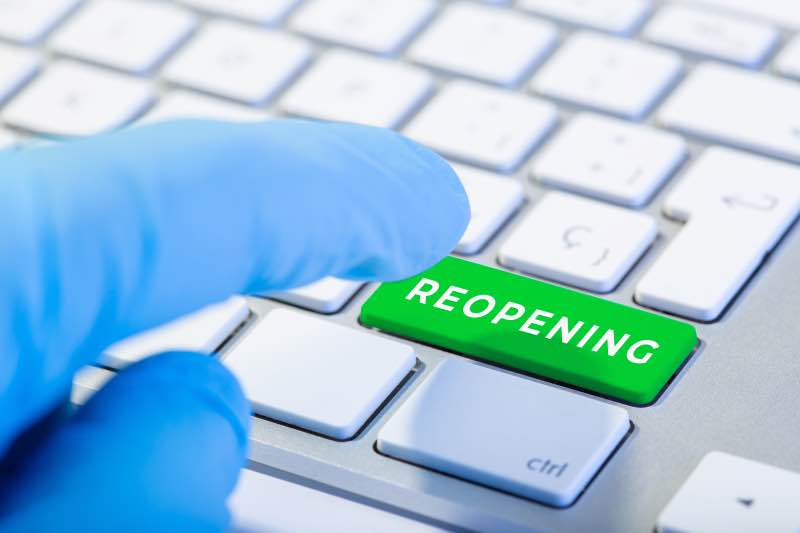
This article is aimed at holiday cottage owners who are looking to safely reopen for the first time since the start of the coronavirus pandemic; those who have been closed for a while and are reviewing their protocols and possibly holiday home owners who are new to holiday letting.
Since holiday home owners were able to reopened in July 2020 after the first lockdown, there have been a number of new rules, regulations and changes to guidance.
If you are unsure where you should start with risk assessments, changeover strategies and understanding the ever-changing rules, this article should help highlight some of the key issues you will need to think about and what positive actions you can take. Whilst it may not answer all your questions, it should give you some ideas so you can start thinking about different scenarios and planning new procedures and protocols to enable you to safely reopen your doors when you are able and feel ready to do so.
Where should I start?
A good place to start is to decide what turnaround strategy you want to offer. Whether you choose to offer back-to-back bookings or prefer to allow a gap, will depend on a number of factors.
First, we recommend you familiarise yourself with the cleaning protocols, FAQs and risk assessment kindly provided by The Professional Association of Self-Caterers (PASC) – click here to view.
These guidelines have been put together by a number of industry bodies including the Association of Scotland’s Self-Caterers (ASSC) and are fast becoming the industry standard. Once you have completed your COVID-19 Risk Assessment we recommend that you apply for the Visit Britain industry standard ‘We’re Good To Go’ consumer mark, which is aimed at providing a ‘ring of confidence’ in the industry.
Online training course
At first, it can seem a little daunting so we highly recommend the online course ‘Covid 19 – Holiday Let Cleaning’ provided by Landlords’ Little Helper. This course is aimed at self-catering operators and takes a practical (and pragmatic) approach on how and when to clean, sanitise and / or disinfect your property. It also covers how to keep yourself, your cleaner and your guests safe. The course will also give you the tools and confidence to implement your own Covid cleaning regime.
The course is £28.80 but our owners get 10% discount (the discount code is on the owners login area under ‘news and updates’) – in our opinion money very well spend as it could be the difference between you feeling confident to re-open sooner rather than later.
It may also help to discuss your plans and ideas with your cleaner / housekeeper to determine what is practical and reasonable.
Once you understand the cleaning protocols and risk assessment, you should have the information needed to decide on your preferred changeover strategy: either leave a gap (for example 72 hours) between guests or opt for back-to-back bookings. Once you have made this decision the rest of the process becomes easier.
Establish new cleaning protocols
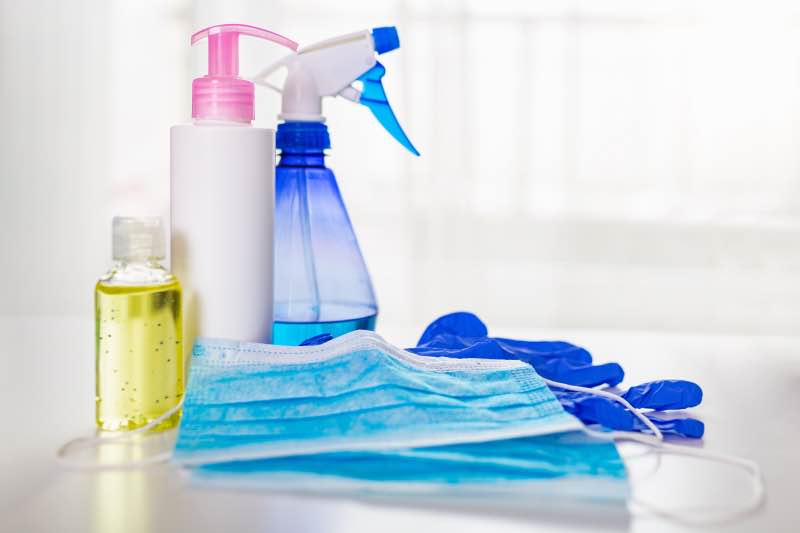
The Covid 19 – Holiday Let Cleaning course we mentioned earlier will help you understand cleaning requirements and the different levels of PPE required for specific risks. For example, cleaning and disinfecting a bathroom directly after being used by a guest with Covid symptoms, carries a different risk profile compared to cleaning and disinfecting a living room 72 hours after a guest has checked out.
In terms of PPE, at the very least cleaners will need a washable apron and reuseable gloves but they may well need disposable gloves, face masks and disposable aprons for higher risk settings.
It is fair to say that it is going to take longer to turn around a property than it used to, so you may need to reevaluate your turnaround time, costs and arrival / departure times for guests.
You may also need to reevaluate the products used for cleaning and disinfecting. To effectively clean hard surfaces the government guidance recommends you use either 0.1% chlorine or a disinfectant that is effective against ‘enveloped’ viruses, ideally including coronaviruses for example SARS-CoV-2.
Whilst cheap, chlorine (bleach) is an unrealistic all-round disinfectant, making virucidal disinfectants a natural choice. However, in order to be effective, the disinfectant must be approved to EN14476 (or EN14476:2013+A2:2019) or EN14675 standard.
Thamesmead Janitorial Supplies stock a good range of cleaning products for the hospitality industry. They recommend BioHygiene (BioHygiene sanitiser leaflet), an all purpose cleaner and disinfectant that is approved to EN14476:2013+A2:2019 standards and available in both trigger form and concentrate. This cost effective, all-in-one cleaner and disinfectant comes in a fragranced and non-fragranced (food safe) version, is eco-friendly and can be used on all high-touch surfaces including glass, light switches, worktops, electrical equipment and fabrics. It can also be used in ULV Foggers.
Thamesmead has kindly put together a ‘favourites’ list for self-catering operators with lots of useful products from cleaning cloths and hand sanitisers to fogging machines. To login and view the items, please click here and enter username: I091 and password: cottage. Please note that prices are subject to VAT and a delivery charge.
Unfortunately disinfecting soft furnishings isn’t so easy. Not only will bleach damage soft furnishings, but it also may not be possible or practical to wash and dry sofa covers and curtains in just a few hours. To overcome this, some owners are investing in steam cleaners (as per government guidance for cleaning upholstered furniture and mattresses), virucidal sprays, ULV fogging machines, UV-C lights and / or virucidal bombs.
However, consideration to practicality (e.g. drying times) and ease of use would need to be given to specialist machines and treatments which may be beyond the scope and budget of the typical holiday home owner.
Now is the time to understand your Covid-19 cleaning requirements, draw up a new cleaning plan / checklist and source suitable products to clean and disinfect your holiday home appropriately.
Declutter
Whilst you do not want to leave your holiday home looking sterile, you may wish to consider removing non-essential items to ease the cleaning load on turnarounds and reduce risks. Your approach with regard to what you decide to leave in your cottage is likely to be influenced by your risk assessment and changeover strategy. If you provide DVDs, books and games, you may decide to remove them or just leave a few that can be alternated on each changeover. Likewise, if you provide children’s toys, you might choose to remove everything that can’t be practically cleaned for now. If you are going to accept back to back bookings, it may be a good idea to remove things like decorative scatter cushions and throws that cannot be put in the washing machine. Re-assess what ornaments and trinkets you have on display and see if there are any unnecessary crockery items that could be temporarily removed from the kitchen.
If you usually leave convenience items like tea, coffee, milk and cooking essentials, it might be a good idea to remove these for now or replace them with items that are sealed and easy to wipe and disinfect. For welcome packs, think about things you could leave that may be easier to disinfect like a welcome bottle of wine or bubbly instead of a home-made cake.
Arrival information will need to be wiped down with disinfectant if laminated or in a plastic cover on each changeover, so it may be easier for now to leave each guest their own paper copy or send the information via email in advance. Whilst we want guests to be comfortable and have access to everything they need on holiday, it is also important to be realistic about what can be sufficiently cleaned to ensure each changeover is as safe and manageable as possible.
Should I leave 72 hours between guests?

The risk of being infected by coronavirus from a potentially contaminated environment decreases over time. Whilst it is unknown at exactly what point there is no risk at all, studies suggest that the risk is significantly reduced after 72 hours. Many people have raised the question of whether a 72 hour gap (or longer) should be left between bookings. Some owners are allowing 7 days between bookings. Only you as an owner can make this decision based upon your personal circumstances.
Once you have completed your risk assessment you should be able to establish whether you feel comfortable in taking back to back bookings or prefer to leave gaps between guests for added peace of mind.
Laundry
In conjunction with your risk assessment, you will need to decide how you are going to handle laundry on each changeover. You might decide to politely ask your guests to strip the beds and put all the dirty linen in bags (you can get cost-effective bags that dissolve in the wash). This should help to avoid either you or your cleaner handling excess laundry and potentially dispersing germs around the room. If you have space to store extra duvets and pillows, you could rotate them on each changeover. Some owners are also giving guests the choice of bringing their own bedding in return for a small reduction in price. Guests might feel more comfortable using their own bedding and it would save cleaners handling used bedding and towels.
Even if you opt to have guests strip beds, you still need to have a process for handling dirty linen (for example additional PPE) for when guests forget.
However you decide to manage your laundry, it makes sense to have plenty of mattress and pillow protectors given you may be washing them between each changeover.
What do I do if I suspect a guest has coronavirus?
As part of your risk assessment, you need to establish what you would do if a guest arrives showing symptoms of Covid-19 or develops symptoms whilst staying. The risk assessment should consider current government advice which needs to be communicated to guests as part of your Covid information pack. Guests showing Covid-19 symptoms should be encouraged to return home if they reasonably can.
PASC have published a useful NHS poster explaining what guests should do if they fall ill with coronavirus symptoms whilst they are on holiday. You can download a copy of the poster here.
Legionnaires’ disease
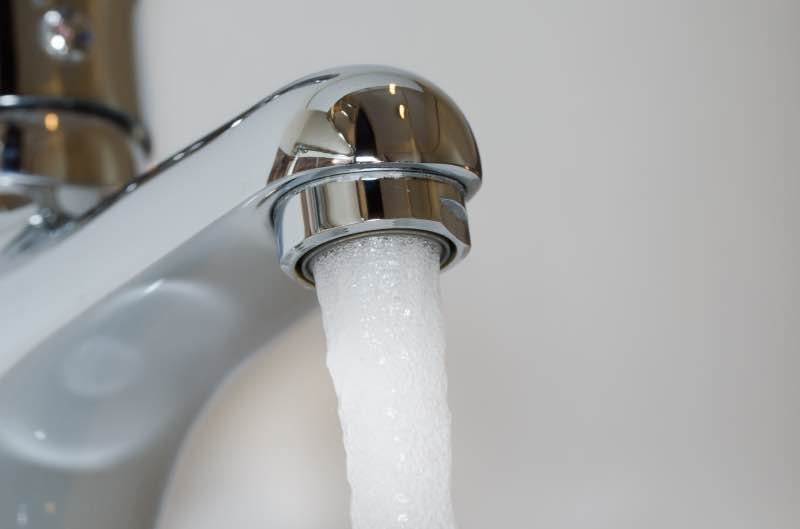
If your property has been empty for any length of time, it is important to be aware of the risk of Legionnaires’ disease. Although rare in the UK, Legionnaires’ disease, which is a type of pneumonia, can be caused by breathing in small droplets of water that contains legionella. Legionella bacteria thrives in warm (usually between 20°C and 45°C) and stagnant water. If the water in your property has not been used for a while it is possible for legionella bacteria to start accumulating.
If you have been unable to visit your property regularly it is important that you flush the water system through before you re-open. You can find out more about Legionnaires’ disease and your responsibilities as a holiday home owner here.
Review your prices and terms and conditions
It is a good idea to review your terms and conditions and cancellation policy. There are plenty of guests keen to go on holiday but many will understandably be nervous about parting with large deposits if there is risk of future lockdowns and changes to restrictions. It is highly likely that owners with more flexible cancellation policies and smaller deposits will gain more future bookings than those with strict cancellation terms.
We also recommend you review your prices. You will need to consider additional cleaning costs as well as any ‘downtime’ if you decide to leave gaps between bookings. However, you also need to be mindful of providing value for money.
You might also decide to review your check in and check out times to allow more time to clean on each changeover.
Make sure marketing material accurately promotes what you are currently able to offer and incorporates any short term Covid changes. If you have temporarily removed some facilities, make sure you communicate the changes with guests who have already booked. This will help manage expectations and avoid disappointment.
We were overwhelmed by the increase in traffic coming through our website once lockdown restrictions eased in July 2020, showing that there is high demand for UK self-catering accommodation during this current time. Demand exceeded availability for the summer months last year and all the signs are indicating that 2022 is set to be a good year for UK self-catering. Given some owners already have forward bookings, and some may choose to remain closed for a while, resist the urge to reduce prices (but ensure you also provide value for money!).
Reassure your guests
Whilst many people are keen to get away on holiday, some will understandably be nervous about travelling and staying somewhere that isn’t ‘home’. In order to help reassure potential guests, let them know about all the additional protocols and precautions you are taking to keep them safe. You could include these on your website, as part of the information you send your guests before their holiday and on marketing material and adverts (Independent Cottages owners can add this to their Covid noticeboard).
Make sure there is plenty of soap next to all the washbasins. Owners have different opinions on displaying signs in holiday homes, but if you aren’t averse to putting up a polite sign to guests, you could remind them to wash their hands frequently.
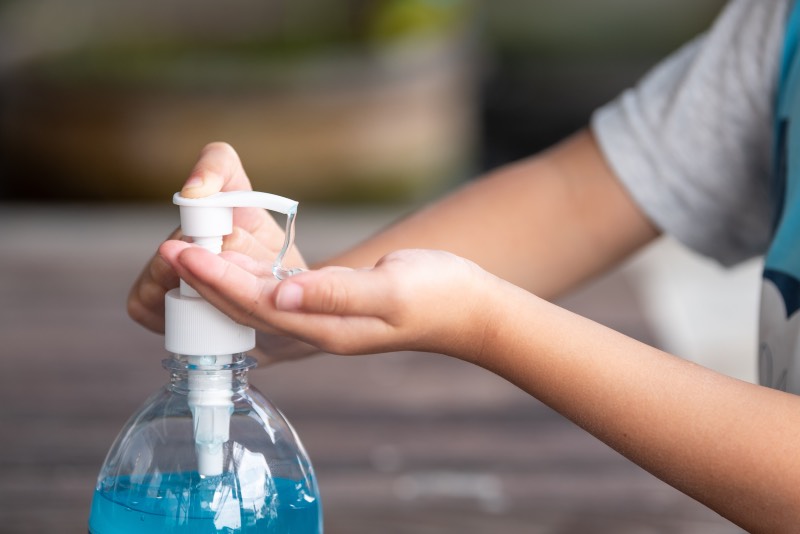
Whilst you don’t want to over-clutter the cleaning cupboard in your property, it is a good idea to provide a few cleaning supplies that guests can use to disinfect surfaces whilst they are on holiday. You might also decide to provide hand sanitisers, both at the point of entry and within the property, disposable gloves and antibacterial wipes. It is worth bearing in mind that if you provide bottles of hand soap, washing up liquid and other cleaning products, you may either need to ensure the bottles are disinfected on each changeover or you have a spare set and swap them over between guests.
If you normally offer a ‘meet and greet’ service when guests arrive at your property you might want to reconsider offering a self-check in and check out service. You can either use a smart lock or key safe (providing your insurance allows it), or even send keys to your guests in the post. Whilst you don’t want to appear inhospitable to guests, you do need to make sure your check-in procedure complies with social distancing guidelines.
Whilst it is no longer a legal obligation to display a QR code, businesses are still encouraged to do so. English and Welsh holiday home owners can download their QR code here and Scottish owners can use Check In Scotland.
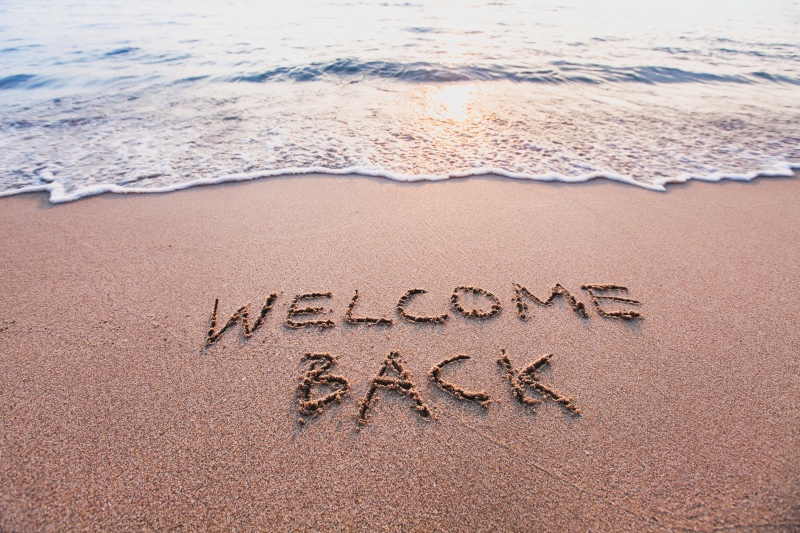
Next steps
We are all facing different scenarios and there is no one-size-fits-all solution. Whilst some owners are happy opening their doors and taking bookings when they are able to do so, others will feel more comfortable waiting a bit longer before re-filling their calendars.
You might also find it useful to read about other considerations for holiday home owners during the coronavirus crisis here.
Please feel free to share any comments you may have with us and other owners by leaving a reply below.
List of useful resources:
PASC COVID-19 Cleaning Guidelines
Covid-19 – Holiday Let Cleaning Course
Information on BioHygiene’s all-purpose virucidal and bactericidal solution
BioHygiene Summary Test Report: BS EN 14476:2013 + A2:2019
Thamesmead Janitorial Supplies price list for holiday home owners
Government Guidance on Social Distancing
Government Guidance COVID-19: cleaning of non-healthcare settings

Thanks Sarah, excellent information and very clearly put across.
Thanks for summarising this so clearly, Sarah. It’s all a bit daunting has given me plenty of food for thought. It does make me wonder if opening up is worth the risk and the effort, not to mention additional costs which won’t be recouped.
Hi Susan, fully appreciate that. We have owners who will be opening up asap once restrictions are lifted and some who are going to wait a little longer; as well as those who want to leave gaps between bookings to give themselves extra peace of mind and breathing space. As an owner renting independently, you get to choose what is the best way forward for both your guests and yourself / your cleaner, taking into consideration your personal circumstances.
The ‘Covid 19 – Holiday Let Cleaning Course’ (mentioned in our article) may well give you the confidence to open once restrictions are lifted and is full of easy to understand, practical advice.
Sarah, Thank you so much, with the lack of central government guidance in the public domain, this blog together with all of the risk assessments and checklists give us a clear way forward.
It’s nice to see that you have prioritised putting owners first, by giving us a clear framework to protect us and our staff team and guests, while other market leaders have given all of their focus to finances.
Well Done from all of us here at Oaks Barn Farm, we look forward to working with you over these emerging times.
Many thanks Sue. At the moment information is ever changing and we are expecting a number of announcements and changes over the coming days so will keep the blog updated. Best wishes to you and your team at Oaks Barn Farm.
Hi all,
Dan from BioHygiene here, I just wanted to reach out to everybody and offer my assistance. If you have any questions about our sanitiser, its application or how we might be able to help then please do get in touch.
Best wishes,
Dan
07557 673219
dfrancis@biologicalpreparations.com
Thanks for this Sarah, excellent and very informative.
For the foreseeable future we are not going to accept short breaks, only 7 or 14 day bookings leaving a week ‘fallow’ before and after each booking. This should minimize the risk of contracting the illness both to our guests and us, as my wife and I clean our holiday cottage ourselves.
What with Corvid 19 risk assessments, cleaning requirements etc and considering our ages (my wife and I our both OAPs) it does make me wonder if it is worthwhile continuing in this business.
Hello Sarah,
Thank you so much for as ever, producing some really excellent advice. I am not sure what to advise guests about the following, as I can’t find this on this on the government website.
“It is important that you make sure your guests are aware of procedures, should they develop symptoms during their holiday.
You also need to take into consideration current government guidance on self-isolation i.e. whether guests need to stay at your property or should travel home.
I have added a page to my T and C s and booking form, listing symptoms and stating guests are required to declare if they have Covid symptoms. What should I do if a guest develops Covid and has to self isolate in my holiday cottage? What If another guest is due to stay during this time? and would I require more extensive (professional?) deep cleaning after such an event? I’d be grateful if anyone has any advice on this, it would be good if there was a standard approach.
Hi Sarah – very good information as usual! Thanks for the time you take to analyse everything and make it sound sensible!!
One question I’ve yet to get any answer for – what about people like us who aim for the family market and have a swimming pool? How do we go about making that safe?
Keep up the good work
Thank you Sarah, very informative. I like many owners have been wading through so much ‘stuff’ but intend to take a sensible, measured approach to it all, our homes are not clinical settings and people will have started going into shops, hairdressers, pubs and the like with no fogging or anti-viral bombs I suspect!
Good luck to everyone and hope it all goes well
Dear Sarah
Thanks a million…this is a life saver. I open up on the 4th July with strong bookings until the 12th August on two properties and that really is without trying. I have decided to leave 24 hours between bookings. The other things I am considering are :
1. Check in at 5 pm no early arrivals or leaving cars on site. Check out at 9 am on departure.
2. Visitors are not allowed in properties and must meet at the end of the drive.
3. Allocated garden area to be stuck too. Plan provided to guests. My cottages are set in my grounds.
4. Dogs on leads at all times outside property.
5. Laundry bag provided and will ask guests to strip beds on departure.
6. Removing non essential items from cottages. Hair dryers, dressing gowns, toiletries, excess stuff. I will provide a list of what we cannot provide in cottages during Covid 19 so they can bring it. Reduces contamination and cleaning.
7. Open windows daily to air property during stay.
8. Cleaning materials and ask guests to leave cottages clean and tidy on departure.
Not sure what to do if you end up with a Covid 19 guest staying? Any suggestions please?
Thank you once again, been getting packs from other forum, but yours Sarah is simply the BEST! Thank you SO much,
liese Cairnes ( Pheasant Cottage, Lymington)
Thank you to everyone for all the comments and information being shared. With regard to what you should do in the even that a guest staying shows Covid-19 symptoms, please take a look at this information provided by the government.
HI Sarah
I would like to add my thanks to the others listed above for the time you have taken to provide this useful information and summary above. I have read through the government guidance which is daunting but comprehensive to work out how we can take bookings safely and am preparing for opening on the 15th July per Scottish Government’s guidance but will hopefully test the new processes in advance of this to assess timing and additional costs. Scottish Government guidance is clear that we ask any guests displaying Covid symptoms to return home.
Good luck to all the independent cottages out there!
I work as a house keeper for a holiday cottage firm. They are about to open up to holiday makers. They are providing us cleaners with home made face masks and our own personal gloves, no aprons. I have suggested that clients strip and bag up their laundry and open windows before leaving. There is no buffer zone in place for clients leaving and new clients coming in. Are myself and my colleges going to be safe going in to clean these properties especially on same day change overs?
Like everyone else, a big thank you Sarah for all your concise information. It is so helpful!
Good luck to everyone in these scary times!
You are most welcome and big ‘thank you’ goes out to everyone for all the comments.
It would appear to be a minefield with all these comments about restrictions, and what owners should put away and what is expected from holidaymakers. There is still too much suspicion about how dangerous COVID19, still is and owners are taking a risk as to whether clients are being honest as to how they are when booking. I have seen suggestions that every item of cutlery and crockery should be washed at every change over, but this I think is an unnecessary suggestion, if you only have two people in a property that can sleep six people.
At the current time I am leaning towards agreeing with comments made earlier about costs that cannot be recovered, and whether it is worth re-opening for the rest of this season, before COVID-19 has been eradicated or under better control.
Even before reading the above comments, I had decided not to take any further bookings for this year or longer if things don’t improve. My apartment in Spain is going to be deep cleaned with Covid in mind, which I will personally oversee, but my concern is the cleaning between bookings. It’s a big move but, as I don’t live there, I’m not happy taking the risk of the apartment not being cleaned to a safe standard. There are two groups booked but I know and, more important, trust them.
Thank you very much for this really helpful practical info.
Delighted to see the BBC now consult you on self-catering! Well done.
Many thanks Oliver.
Hi Sarah,
Many thanks for all of your advice during the current climate. It certainly feels as though we are in unchartered waters!
Do you have any information regarding liability if a guest was to report that they had developed Covid-19 whilst staying in your accommodation? Are other accommodation providers issuing some kind of disclaimer?
Many thanks
Elaine
I’ve got the same concern, and cannot find an answer. However, i would think that it would be hard to prove guests had contracted Covid 19 from your property as it is a pandemic and could be carried by folk not showing symptoms as well as being picked up in transport pubs and numerous other places the guest could have visited. I understand that no insurer will insure you against pandemics or communicable disease, so I suppose to avoid claims, do the risk assessment, follow the protocols, and get the approved cleaning solutions etc. as evidence if a claim is made. T&C may well be advisable to review. In the same position myself – but hope this helps.
Hi again. My cleaner was very unhappy about cleaning within a 8 hour turnaround as she felt she didn’t know who the guests were, or if they may be infectious. We have now decided to leave a minimum of 72 hours (but most likely a full week) between bookings. This will make the cleaning of every single item in the cottage, inside drawers, steaming all soft furnishings etc less necessary, but still gives us a better income than a long let, and I think some guests will be more comfortable with this too.
A very helpful Article indeed. Thank you for taking the time to publish. We have just placed an order with Thamesmead for their products as it is a very comprehensive range.
Very pleased to find your article. It sounds very reassuring. I am not an owner but a customer. We are booked to stay in a large house in October for a family birthday celebration. We would in total be coming from six different households if all family members do decide to come. At the moment of course that is totally out of the question. I imagine that you probably don’t have any more information than we do on the future plans for multi occupancy holiday homes but I thought I would ask just in case. We have not yet paid the balance, only the deposit and it is hard to know what to do.
Thanks so much Sarah for this helpful advice. I am one of the owners leaving gaps between bookings and it is good to know that some others are feeling the same and I’m not being too extreme. The work you are putting in collecting and keeping up with this information to support us, is much appreciated and just another example of the benefits of an independent set up. We are just another number to the big agencies.
You are most welcome. We sadly can’t answer every question but will do our best to answer as many as possible and keep the article up to date.
I’m a cleaner cum host in a holiday let.having meticulously followed the Schofields list of deep cleaning and taking pride in being as covid19 aware as possible l was horrified tonight when the owner of the holiday let said back to back bookings are acceptable and today a time of 7hours only from guests going and guests arriving was acceptable.
I refused to accept these guests..should l just resign? The owner has never accepted the need to deep clean.
Great info! Is there a repository somewhere or notices to print and place in the properties for guests? E.g. please wash your hands regularly, or please use the hand sanitiser provided, etc? Thank you.
Hi Frederica, we have not provided this as owners have very different views about notices but you can easily purchase them online from many companies (Thamesmead Janitorial sell a good range as do Amazon and many others).
Hey Sarah,
Very informative and helpful article!! Thanks for the advice…Glad to see the practical information. The establishment of new cleaning protocols seems good point to me.
Just a thank you to everyone who has shared their thoughts about taking guests again – especially to Sarah who has provided much needed information to help us prepare for re-opening. We have our first guests this week. We are following as best we can the cleaning/disinfecting guidelines provided by PASC; swapping duvets and pillows at each changeover; are using the recommended cleaning and disinfecting products etc. We are still feeling a little apprehensive but we also feel we are as prepared as we can be.
You are most welcome and we very much appreciate all the information owners have shared. Picking up on Mark’s comment below, has anyone got any information on how successful they have been in claiming for loss of income with their insurance company? We are hearing more positive stories coming through so any feedback would be much appreciated. Good luck to everyone who has and is opening up and welcoming guests back.
We’re not happy with the concept of using biocide fogging machines to disinfect areas in our holiday home. So, in addition to a thorough process of cleansing wipe down with diluted biocide and/or isopropyl alcohol, we’re going to be using Ultraviolet light (UV-C) room sterilisation. This process is used in hospitals and means that all areas within a room are treated simultaneously. Our lamp treats a room in about 20 minutes, but during that time no-one is allowed in to the room. It also takes some work to initially “calibrate” the exposure time for each room and some investment in good quality sterilisation lamps, but we end up with a documented process and very limited chemical residue.
One point to watch out for is that most of the UV LED lamps on Amazon/Ebay are fakes with little genuine UV output. Yes, I got stung initially.
Thanks for providing our owners with this information and feedback Charles.
I am not a holiday home owner – I have just returned from a trip to scotland – I had pre booked 2 apartments in different locations and 1 guest house – the first apartment was spotless and had been sanitised, the second was not it was really bad, the floor had not been swept or mopped, lights did not work, dirty bag of laundry in kitchen and it had a very stale odour – it was not nice and I couldn’t stay there. I complained to booking . com who asked for photos which was impossible as i’d already left but explained that it would have been difficult to photo unsanitised conditions! I have not had a refund nor likely to get one as the owner said it was clean and I doubt very much that she had even bothered to look at sanitising holiday accomodation regulations. I did manage to find alternative accomodation which was spotless, and also the guest house which i stayed in at the end of my trip was spotless and sanitised. It makes me very wary about booking accomodation without a certified covid certificate.
Thanks for highlighting this so clearly, Sarah. It’s all a little overwhelming has given me plenty of food for thinking. It makes me wonder if opening up is worth the risk and the effort, not to mention extra expenses that will not be recovered.
Hi again. My cleaner was very unhappy about cleaning within a 8 hour turnaround as she felt she didn’t know who the guests were, or if they may be infectious. We have now decided to leave a minimum of 72 hours (but most likely a full week) between bookings. This will make the cleaning of every single item in the cottage, inside drawers, steaming all soft furnishings etc less necessary, but still gives us a better income than a long let, and I think some guests will be more comfortable with this too.
This is a perfect post. Thank you so much for this share.
Thanks for highlighting this so clearly,